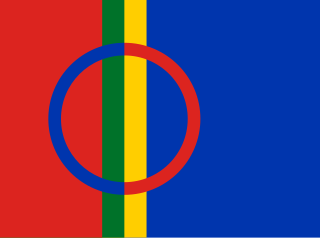
Finland, officially the Republic of Finland, is a Nordic country in Northern Europe. It borders Sweden to the northwest, Norway to the north, and Russia to the east, with the Gulf of Bothnia to the west and the Gulf of Finland to the south, opposite Estonia. Finland covers an area of 338,145 square kilometres (130,559 sq mi) and has a population of 5.6 million. Helsinki is the capital and largest city. The vast majority of the population are ethnic Finns. Finnish and Swedish are the official languages, with Swedish being the native language of 5.2% of the population. Finland's climate varies from humid continental in the south to boreal in the north. The land cover is predominantly boreal forest biome, with more than 180,000 recorded lakes.

The politics of Finland take place within the framework of a parliamentary representative democracy. Finland is a republic whose head of state is President Sauli Niinistö, who leads the nation's foreign policy and is the supreme commander of the Finnish Defence Forces. Finland's head of government is Prime Minister Petteri Orpo, who leads the nation's executive branch, called the Finnish Government. Legislative power is vested in the Parliament of Finland, and the Government has limited rights to amend or extend legislation. The Constitution of Finland vests power to both the President and Government: the President has veto power over parliamentary decisions, although this power can be overruled by a majority vote in the Parliament.
The Green League, shortened to the Greens, is a green political party in Finland.

The president of the Republic of Finland is the head of state of Finland. Under the Constitution of Finland, executive power is vested in the Finnish Government and the president, with the latter possessing only residual powers. The president is directly elected by universal suffrage for a term of six years. Since 1994, no president may be elected for more than two consecutive terms. The president must be a natural-born Finnish citizen. The presidential office was established in the Constitution Act of 1919. The incumbent president is Sauli Niinistö. He was elected for the first time in 2012 and was re-elected in 2018.

The Parliament of Finland is the unicameral and supreme legislature of Finland, founded on 9 May 1906. In accordance with the Constitution of Finland, sovereignty belongs to the people, and that power is vested in the Parliament. The Parliament consists of 200 members, 199 of whom are elected every four years from 13 multi-member districts electing 7 to 36 members using the proportional D'Hondt method. In addition, there is one member from Åland.

The prime minister of Finland is the leader of the Finnish Government. The prime minister and their cabinet exercise executive authority in the state. The prime minister is formally ranked third in the protocol after the president of Finland and the speaker of the Parliament. Finland's first prime minister, Pehr Evind Svinhufvud, was appointed on 27 November 1917, just a few days before the country declared its independence.

The Centre Party, officially the Centre Party of Finland, is an agrarian political party in Finland.

The Finns Party, formerly known as the True Finns, is a right-wing populist political party in Finland. It was founded in 1995 following the dissolution of the Finnish Rural Party.
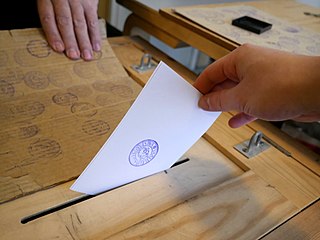
There are four types of elections in Finland. Each Finnish citizen at least 18 years of age has the right to vote in each of the elections, which decide the following: the president, the parliament, the MEPs, and the municipal and city councils.

The Finnish Declaration of Independence was adopted by the Parliament of Finland on 6 December 1917. It declared Finland an independent nation, ending its autonomy within Russia as the Grand Principality of Finland, with reference to a bill simultaneously delivered to the Parliament to make Finland an independent republic instead.
The 2004 European Parliament election in Finland was the election of MEP representing Finland constituency for the 2004-2009 term of the European Parliament. It was part of the wider 2004 European election. The vote took place on 13 June. Both the Finnish Social Democratic Party and the Finnish Centre Party improved their vote at the expense of the conservative National Coalition Party and the Greens.
The Constitution of Finland is the supreme source of national law of Finland. It defines the basis, structures and organisation of government, the relationship between the different constitutional organs, and lays out the fundamental rights of Finnish citizens, and individuals in general. The original Constitution Act was enacted in 1919, soon after Finland declared its independence in 1917. The current draft of the Constitution came into force on 1 March 2000.
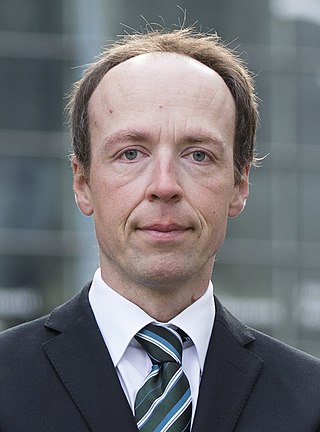
The speaker of the Parliament of Finland, along with two deputy speakers, is elected by Parliament during the first plenary session each year. Speakers are chosen for a year at a time. In addition to their preparing the work in plenary sessions the speakers also play a key role in Parliament's international co-operation, which includes visits by speakers and international delegations as well as participation in numerous interparliamentary organisations.

The Finnish Government is the executive branch and cabinet of Finland, which directs the politics of Finland and is the main source of legislation proposed to the Parliament. The Government has collective ministerial responsibility and represents Finland in the Council of the European Union. In the incumbent Orpo Cabinet, the Government comprises 19 ministers leading 12 ministries.
Same-sex marriage has been legal in Finland since 1 March 2017. A bill for the legalisation of same-sex marriages was approved by the Finnish Parliament in a vote of 101–90 on 12 December 2014 and signed into law by President Sauli Niinistö on 20 February 2015. Further legislation to harmonise other laws with the legalisation of same-sex marriage was passed in 2016. The law took effect on 1 March 2017. Finland was the last Nordic sovereign state to legalise same-sex marriage, the 13th country in Europe overall, and the 21st worldwide.
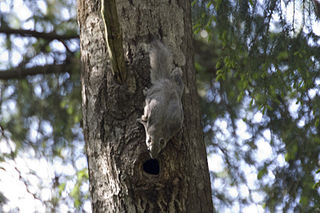
The Siberian flying squirrel is an Old World flying squirrel ranging from the Baltic Sea in the west, throughout Northern Asia to the coast of the Pacific Ocean in the east. It is the only species of flying squirrel in Europe and is considered vulnerable in the European Union where it occurs only in Estonia and Finland. In Latvia, it was last sighted in 2001 and has been considered to be locally extinct since 2013.

The Kingdom of Finland was a failed attempt to establish a monarchy in Finland in the aftermath of the Finnish Declaration of Independence from Russia in December 1917 and the Finnish Civil War from January–May 1918. The victorious Whites in the Parliament of Finland began the process of turning Finland into a kingdom and creating a monarchy. Although the country was legally a kingdom headed by a regent for over a year, the king-elect Frederick Charles never reigned nor came to Finland following Germany's defeat in World War I. Republican victories in subsequent elections resulted in the country becoming a republic.
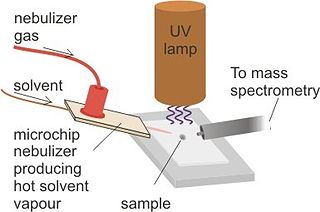
Desorption atmospheric pressure photoionization (DAPPI) is an ambient ionization technique for mass spectrometry that uses hot solvent vapor for desorption in conjunction with photoionization. Ambient Ionization techniques allow for direct analysis of samples without pretreatment. The direct analysis technique, such as DAPPI, eliminates the extraction steps seen in most nontraditional samples. DAPPI can be used to analyze bulkier samples, such as, tablets, powders, resins, plants, and tissues. The first step of this technique utilizes a jet of hot solvent vapor. The hot jet thermally desorbs the sample from a surface. The vaporized sample is then ionized by the vacuum ultraviolet light and consequently sampled into a mass spectrometer. DAPPI can detect a range of both polar and non-polar compounds, but is most sensitive when analyzing neutral or non-polar compounds. This technique also offers a selective and soft ionization for highly conjugated compounds.

Sanna Mirella Marin is a Finnish politician who served as prime minister of Finland from 2019 to 2023 and as the leader of the Social Democratic Party of Finland (SDP) from 2020 to 2023. She was a Member of Parliament from 2015 to 2023. She is still actively involved in the Finnish local politics as a member of the Tampere city council. She resigned from her position in the Finnish parliament to start as a strategic adviser on political leaders' reform programmes in the Tony Blair Institute in September 2023.



